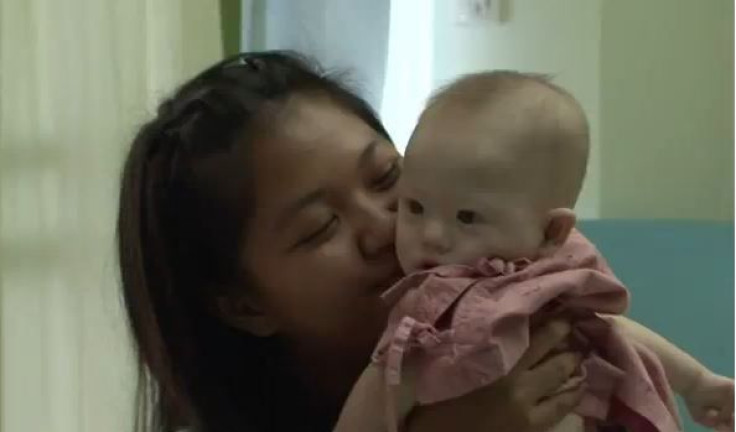Thai Baby With Down Syndrome Raises Concerns Over International Surrogacy

Surrogacy can be a gift of a solution for some parents who struggle with fertility. However, the international case of a 7-month-old baby boy born with Down syndrome gave birth to ethical problems for one couple and their Thai surrogate mother.
Twenty-one-year-old Pattaramon Chanbua of Sri Racha, Thailand agreed to be a surrogate mother and carry her babies for an Australian couple for $9,300 through an agency in Bangkok. When she gave birth to twins on Dec. 23, the couple only took home the healthy twin sister and left the newborn boy, named “Gammy,” with Down syndrome, a lung infection, and a congenital heart condition.
“I’ve never felt angry at them or hated them. I’m always willing to forgive them,” Pattaramon told The Associated Press. “I want to see that they love the baby girl as much as my family loves Gammy. I want her to be well taken care of.”
According to Chanbua, the parents and agency found out the baby had Down syndrome when she was four months pregnant, but it wasn’t until the seventh month that the agency told her and the parents asked her to terminate the pregnancy through an abortion. "I asked them, 'Are you still humans?' I really wanted to know," Chanbua said, recalling her decision to continue the pregnancy and keep Gammy alive, which was based on her religious beliefs.
Chanbua, who already has a 6-year-old son and a 3-year-old daughter, pursued becoming a surrogate mother because of the high compensation the agency promised her, which she is yet to see. When the Australian couple came to pick up the baby girl, they didn’t speak because they couldn’t understand one another. "We saw a few people at the hospital. We [didn't] know who the surrogate was — it was very confusing. There was a language barrier," the Australian parents, who wish to remain anonymous, said.
Chanbua signed custody over to the couple through documents written in English, which continued to make the exchange even murkier than it already was. She was left with the decision to keep Gammy, who is now in the hospital fighting a life-threatening heart condition. "I was really stressed out and I was worried about so many things. What am I going to do? How am I going to earn enough money to raise him? But then I just told myself that I just have to try, even if it means I will be indebted," Chanua said.
In Thailand, there are no laws directly relating to the practice of surrogacy, which is why it's largely unregulated and a medical gray area. The laws on surrogacy differ around the world, which is what makes it such a delicate and unclear situation for the Australian couple who took the healthy twin and left the sick one behind for an unprepared Thai woman.
"The alleged circumstances of the case raise broader issues relating to surrogacy in Thailand," said a spokeswoman for Australia's Department of Foreign Affairs and Trade, according to The Wall Street Journal. "Australian government agencies are examining these issues in consultation with authorities in Thailand."
In Australia and the United States, laws on surrogacy vary from state to state, which thickens the confusing plot already. In many countries, including Germany and France, women are prohibited from carrying another woman's child altogether. Other countries ban payments that go beyond compensation for medical expenses or limit the use of fertility treatments or donor eggs.
“It’s a very, very sad story,” Australian Prime Minister Tony Abbott said, according to the WSJ. "It illustrates some of the pitfalls involved in this particular business."
The twins are biologically the Australian parent’s children, and because they left their one sick baby for Chanbua to raise, who is already financially struggling to raise her own children, countries across the world weigh in. Australia’s government is considering intervening in the situation, according to the AP, who say Gammy may be entitled to Australian citizenship. However, the case “is very, very murky.”
“It’s hard to understand how a couple could not accept a child with their own genetics, if it was disabled, that is their choice. But it does expose some of the problems around international surrogacy,” Sam Everingham, the director of Families Through Surrogacy in Sydney, Australia, told the WSJ. “It’s very important that couples go to counseling before they embark on surrogacy so they make sure they cross these issues, which clearly didn’t happen in this case.”
Charitable, anonymous donors have taken to the crowd-sourcing site GoFundMe to help raise money for Chanbua and her family to handle the medical costs Gammy needs to survive. As of July 22, they’ve already raised more than $222,000.
“I’m going to save the money for him,” Chanbua said. “Actually, I just want the baby to have a house. It doesn’t have to be big. I only want him to live in a good house and be comfortable.”



























